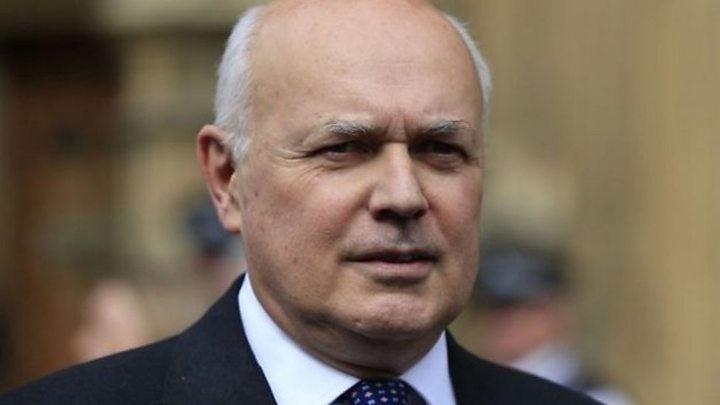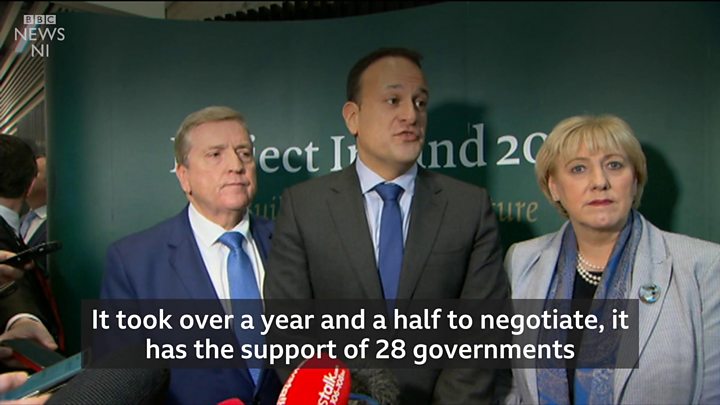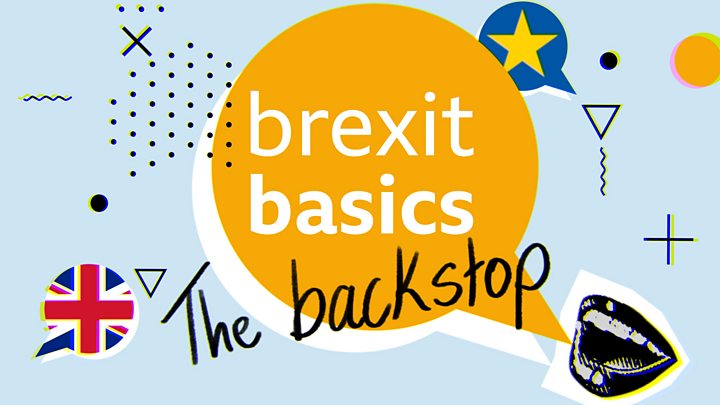Irish PM ‘playing a game’ with backstop
Former Conservative leader Iain Duncan Smith has accused the Irish prime minister, Leo Varadkar, of “playing a game” with the Irish border backstop.
It comes as Prime Minister Theresa May seeks extra assurances from EU leaders in a bid to rescue her Brexit deal.
A vote on the government’s plan due to be held on Tuesday has been called off.
But the EU Commission President, Jean-Claude Juncker, has said the deal is not up for renegotiation and that “Ireland will never be left alone”.
Backstop needs ‘radical surgery’
The backstop is the insurance policy arrangement aimed at avoiding a return to a hard border – physical checkpoints or infrastructure – along the 310-mile (500-km) border between Northern Ireland and the Republic of Ireland after Brexit.
The backstop is just as unacceptable now as it was last December. It is not a continued defence of the Withdrawal Agreement that is required, but substantive change of this legally binding text.https://t.co/ZZY7xgBSmB
End of Twitter post by @NigelDoddsDUP
It has faced opposition from Labour and other opposition parties, and the DUP – which backs the government in a confidence-and-supply pact – but says it will not back the deal unless there is “radical surgery” to amend its terms.
If it took effect, it would see Northern Ireland only remain aligned with the EU single market in some areas, meaning new regulatory barriers between GB and NI.
The UK would also not be able to leave the backstop without EU agreement.
Mrs May called off the Commons vote on Monday after it looked like the government was facing defeat on the deal.
She is understood to be seeking legal guarantees that the UK will not be trapped in the Northern Ireland backstop plan indefinitely.
Why has Mr Duncan Smith criticised the Irish government?
Mr Varadkar, the taoiseach, has said it is not possible to renegotiate the backstop without “opening up all aspects” of the Brexit agreement.
But Mr Duncan Smith told BBC News that Mrs May should be telling the EU27 that the backstop is “intolerable”.
“There is absolutely no requirement to have this ludicrous backstop pressed upon the UK,” he said.
“The EU knows it and so does Mr Varadkar, but he’s playing a game for Irish politics and that needs to stop. The UK has to say to them [EU27 leaders]: ‘You’re putting at risk your own settlement if you don’t agree something.'”
He said the UK and EU could still agree an open-borders policy without the backstop.
What has been the response from the Irish government?
Irish deputy prime minister (Tánaiste) Simon Coveney has defended his government’s insistence on a backstop.
He told Irish national broadcaster RTÉ: “I hope we can provide (Theresa May) with the reassurance she needs now to be able to go back convincingly to Westminster to show that the backstop is not something to be feared by the British Parliament, but actually something that is very much consistent with the responsibilities of both the British government and Irish government, and to the people of this island.”
Mr Coveney also said his government would ramp up its plans for a no-deal Brexit scenario.
He is to bring a detailed paper to cabinet on Tuesday looking at various outcomes.
“We are now actively, not only preparing for that, but taking actions to ensure that if necessary we will be ready on 29 March for Britain to leave the EU without a deal,” he said.
What is the EU saying?
In Brussels, Mr Juncker said there was “no room whatsoever” for renegotiation.
He told the European Parliament the EU could give further clarification but that the withdrawal agreement, in all its parts including the backstop, would not be reopened.
#Brexit has become a mess. A vote delayed. Mrs May returning to Brussels. My two messages: we'll never let down Ireland; it’s out of the question to renegotiate the backstop & if you are looking for a closer future relationship to avoid the backstop, this will be no problem w/ us
End of Twitter post by @guyverhofstadt
Mr Juncker said the backstop was “necessary” for the entire coherence of the agreement and it was necessary for the Republic of Ireland.
“Ireland will never be left alone,” he added.
Why is Northern Ireland important in all of this?
Both the EU and UK have committed to ensuring the border between Northern Ireland and the Republic of Ireland remains as frictionless after Brexit as it is now.
Their back-up plan, if a solution cannot be found through a wider trade deal, is the Northern Ireland protocol: the backstop.
Four pro-remain parties in Northern Ireland – Sinn Féin, the SDLP, the Alliance Party and the Greens – as well as a number of business and agri-food groups, have urged Parliament to back the deal.
In a statement, the leaders of those parties called for the backstop to be “banked”, in order to protect the Good Friday Agreement.
How has this played into the Stormont stalemate?
Northern Ireland has been without a functioning devolved government for almost two years, after a row between the DUP and Sinn Féin over a flawed green energy scheme.
They are the two largest parties, which have to share power at Stormont due to structures set out in the Good Friday peace Agreement, but their opposite stances on Brexit have further strained relations.
Former Prime Minister Sir John Major criticised the political breakdown during a speech he made at an event in Dublin on Tuesday.
He told the Institute of International and European Affairs that Brexit had “inserted its very own poison into the turbulent politics of Northern Ireland”.
He also said the government was “hindered” in its attempts to restore power sharing at Stormont, due to the confidence-and-supply pact it signed up to with the DUP after last year’s general election.
The remarks came a day after he accused unionists opposing the backstop in the withdrawal agreement of “breathtaking ignorance”.
In Dublin, he said there was now the need to revoke Article 50 “with immediate effect”.
What happens now?
A summit of EU leaders is still due to take place this Thursday.
Meanwhile, Downing Street has said a Commons vote will be held on the deal before 21 January.
Source: Read Full Article





